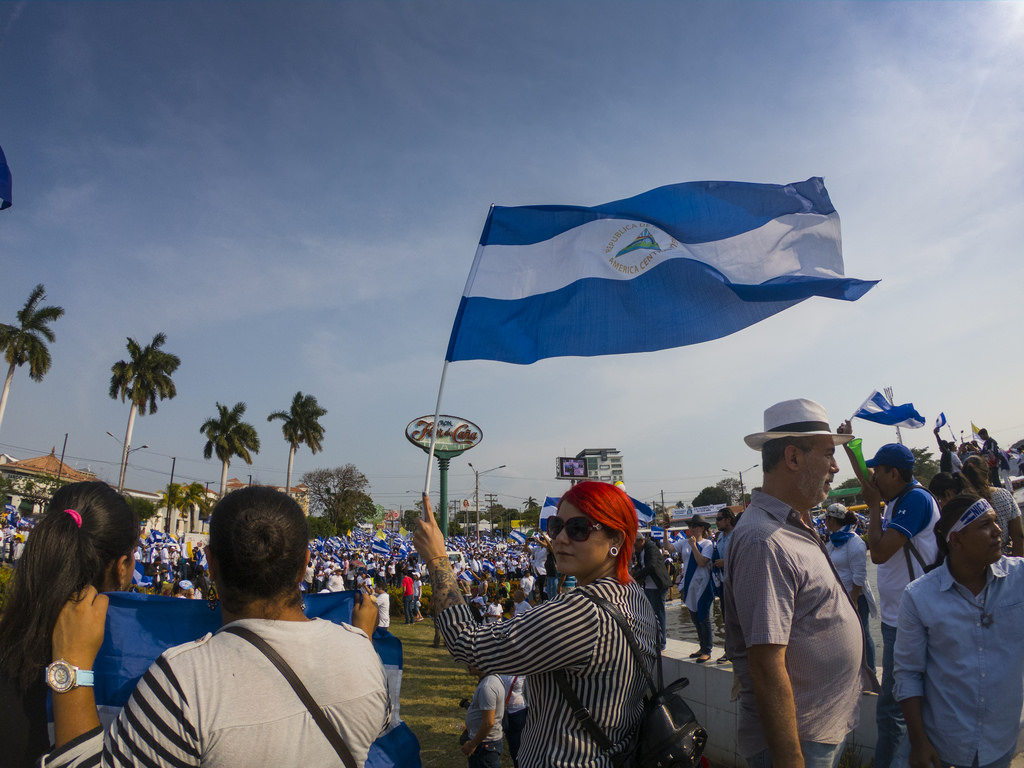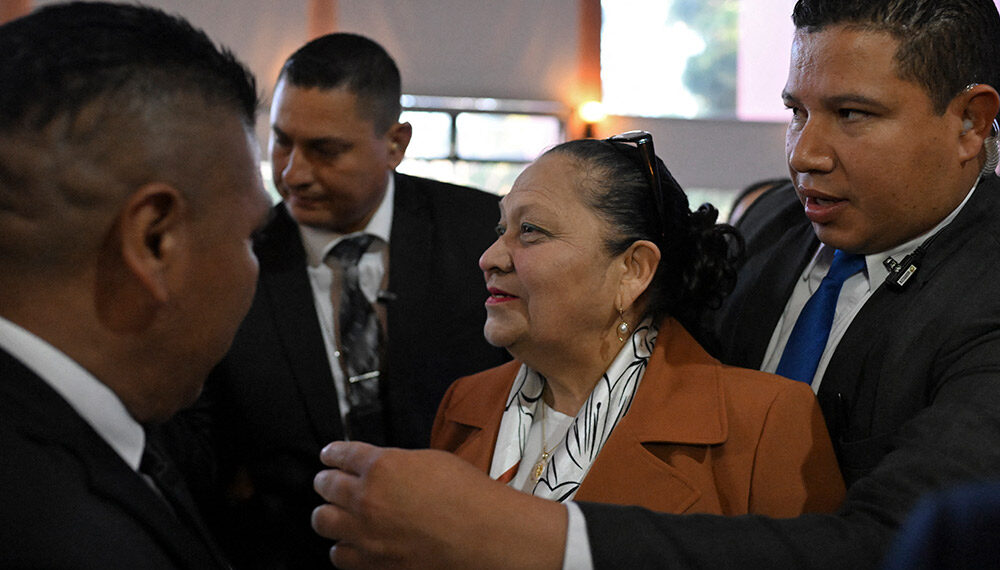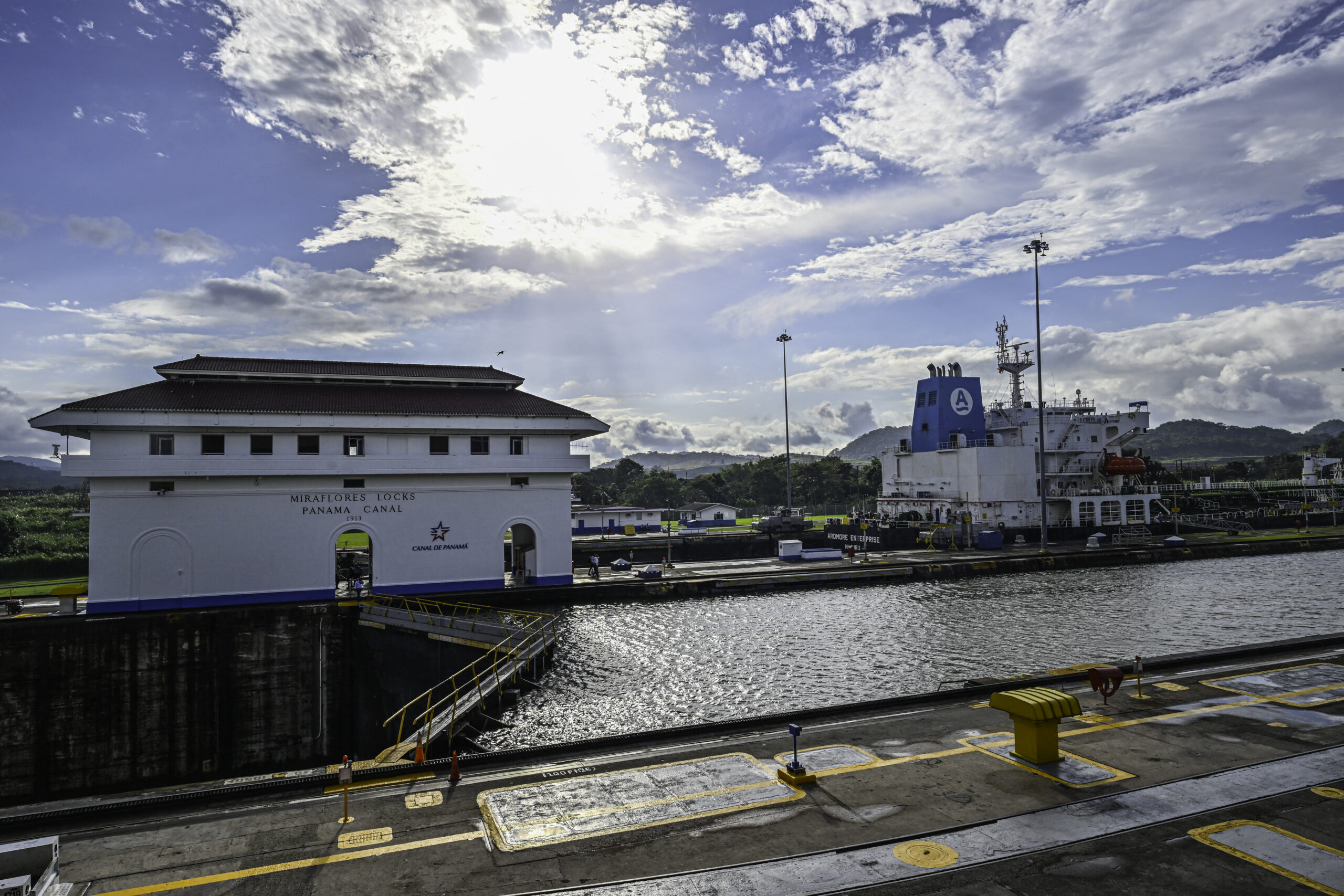Central America
Harris says US wants to work with Guatemala to limit migration

AFP/Editor
US Vice President Kamala Harris said Monday the United States hopes to work with Guatemala to address the root causes of illegal migration by creating “a sense of hope” in the poverty- and violence-plagued country, on her first trip abroad since taking office.
Meeting President Alejandro Giammattei in Guatemala City, Harris said reducing undocumented migration from Central to North America was a priority for US President Joe Biden’s administration.
“Most people do not want to leave the place where they grew up,” loved ones, and people with whom they share a language and culture, Harris said.
But they often do so “either because they are fleeing some harm or because they simply cannot satisfy their basic needs by staying at home,” she added.
Regardless of their reasons for leaving, Harris urged would-be migrants not to make the journey: “Do not come” to the United States, she told them.
“The United States will continue to enforce our laws and secure our borders… If you come to our border, you will be turned back,” she said.
Instead, she proposed that the United States and Guatemala “work together” to find solutions to “long-standing problems.”
Critically, people must be given “a sense of hope that help is on the way,” said Harris.
“It must be coupled with relationships of trust. It must be coupled with tangible outcomes, in terms of what we do as leaders to convince people that there is a reason to be hopeful about their future and the future of their children.”
– Create conditions –
Giammattei said Guatemala wanted to cooperate “to create conditions in Guatemala so that they (young people) can find here the hope they do not have today.”
Harris announced a joint task force on smuggling and human trafficking, a women’s empowerment program, and an anti-corruption task force to help Central American law enforcement prosecute cases.
She rejected Republican criticism of the fact that neither she nor Biden had visited the US southern border, saying she had come to Central America to discuss matters in a “way that is significant and has real results” rather than making “grand gestures.”
Harris, who later flew to Mexico to meet President Andres Manuel Lopez Obrador on Tuesday, said she had told Giammattei the United States would send 500,000 coronavirus vaccines to Guatemala.
Her trip is part of the Biden administration’s promise to implement a more humane immigration policy after the hardline approach taken by his predecessor Donald Trump.
But the Republican opposition has accused Biden of creating a “crisis” on the country’s southern border by failing to rein in migration.
Congress must still decide whether to approve the $861 million Biden has asked for next year as part of a $4 billion plan to tackle the issue.
American officials have in recent days called on Central American countries to defend democracy and fight corruption in a bid to improve conditions at home and thus eliminate a driving factor for migration.
Asked Monday about Guatemala’s anti-corruption stance, Giammattei said: “How many cases of corruption have I been accused of? I can give you the answer: Zero.”
Central America
Nicaragua Held Responsible for Harassment of Opposition Prosecutor and His Family

The Inter-American Court of Human Rights on Wednesday found Nicaragua responsible for threats, harassment, and attacks suffered by opposition election monitor Jaime Antonio Chavarría and his family after he reported irregularities during the July 27, 2008 municipal elections.
Chavarría was serving as an electoral verification prosecutor for the opposition Constitutional Liberal Party at a polling station in Managua on election day. He filed a formal objection with local authorities, complaining that the polling center had closed before the scheduled time while voters were still waiting to be verified.
According to the ruling, Chavarría and several relatives present at the site were subjected to insults and threats by a representative of the ruling Sandinista National Liberation Front (FSLN). As they were leaving the area, they were intercepted and attacked by a large group of individuals allegedly incited by local Sandinista leaders.
“The events were witnessed by police officers who refrained from intervening. Mr. Chavarría Morales and his relatives, who suffered various injuries, managed to escape in their vehicle, which the aggressors attempted to set on fire,” the court detailed.
Chavarría reported the incident to the National Police, but the case was ultimately shelved in May 2016. Acts of harassment and intimidation continued over time.
The court concluded that the State bore responsibility for the threats, harassment, and subsequent attacks following July 2008, citing the participation or acquiescence of state agents in some of the incidents, as well as the failure to adopt protection and investigative measures.
In its judgment, the court determined that Nicaragua violated Chavarría’s rights to personal integrity, freedom of thought and expression, political rights, equality before the law, and the right to defend human rights.
The ruling also established state responsibility for violations affecting the personal integrity, judicial guarantees, judicial protection, and family protection rights of Chavarría and for the harm caused to the life plans of his children: Cindy Alicia Chavarría Alonso, Jeffer Joaquín Chavarría Alonso, and Jaime Antonio Chavarría Alonso.
Central America
Guatemala’s Attorney General Fails in Bid for Top Court Seat Amid Corruption Allegations

The Attorney General of Guatemala, Consuelo Porras, failed on Tuesday in her bid to join the country’s highest constitutional court, a position that would have granted her immunity from corruption allegations for which she has been sanctioned by the United States and the European Union.
Porras, whose term as attorney general ends in May, did not receive a single vote in the final round of voting to become a magistrate of the Corte de Constitucionalidad, whose rulings are final and cannot be appealed.
The Supreme Court reelected Dina Ochoa and Claudia Paniagua as its representatives to the Constitutional Court.
Ochoa is considered close to former presidents Jimmy Morales (2016–2020) and Alejandro Giammattei (2020–2024), both accused of corruption. Paniagua, like Porras, has been sanctioned by the United States.
Washington and the European Union have labeled Porras as “corrupt” and “undemocratic,” accusing her of attempting to block the inauguration of Social Democratic President Bernardo Arévalo two years ago.
In addition, the 72-year-old attorney general—who is seeking a third term—has been accused of forcing anti-corruption officials, journalists, and social leaders into exile. She denies the allegations and claims they are part of a political persecution campaign.
Porras’ chances of remaining in office, a position she has held since 2018, are considered slim, as President Arévalo is responsible for appointing the next attorney general.
Central America
Panama Canal Monitoring Trade as Middle East Conflict Disrupts Shipping

The Panama Canal Authority (ACP) said Monday it is closely monitoring global maritime trade developments following the conflict triggered by joint U.S. and Israeli strikes against Iran.
However, the ACP described it as “premature” to predict potential consequences for vessel traffic through the interoceanic waterway, which handles roughly 5% of global maritime trade.
“The Panama Canal continuously monitors the evolution of international maritime trade and the dynamics that may influence its flows,” the authority said in a statement. The canal’s main users are the United States and China, connecting primarily the U.S. East Coast with Asia, including South Korea and Japan.
The ACP emphasized that the canal “continues to operate safely, efficiently, and reliably,” providing uninterrupted service to the global maritime community.
Global Shipping Disruptions
The U.S.-Israeli military operation against Iran and Tehran’s retaliatory actions have disrupted global maritime traffic, particularly oil tanker routes.
Shipping giants Maersk and CMA CGM have suspended transits through the Strait of Hormuz as well as crossings via the Suez Canal, the key route linking the Mediterranean Sea and the Red Sea.
As a result, cargo vessels are now rerouting around Africa to reach Europe from the Middle East and Asia — a detour that adds several thousand kilometers and several days to voyages.
-

 International4 days ago
International4 days agoIran Reports 201 Dead, 747 Injured After U.S. and Israeli Strikes
-

 International3 days ago
International3 days agoBrazil’s Supreme Court Rejects Bolsonaro’s Bid for House Arrest
-

 International3 days ago
International3 days agoAnti-ICE Billboard Campaign Targets Immigration Spending in 31 U.S. Cities
-

 International2 days ago
International2 days agoSpain’s Prime Minister to Address Nation Amid Trump’s Trade Threats
-

 International4 days ago
International4 days agoPope Leo XIV Urges End to ‘Spiral of Violence’ in Middle East
-

 Sin categoría5 days ago
Sin categoría5 days agoTrump: ‘We Think It’s True’ Amid Claims Iran’s Supreme Leader Was Killed
-

 International5 days ago
International5 days agoSecurity Council to Hold Emergency Meeting on Middle East Crisis
-

 International1 day ago
International1 day agoWhite House Says Spain Agrees to Cooperate with U.S. Military After Trump Threatens Trade Embargo
-

 International3 days ago
International3 days agoTrump Warns of ‘Major Wave’ of Attacks as Iran Conflict Escalates
-

 International3 days ago
International3 days agoMexico Calls for Immediate Probe After National Dies in ICE Custody
-

 International2 days ago
International2 days agoNew York Announces First 2,000 Seats in Universal 2-K Program
-

 International1 day ago
International1 day agoSpain Denies Any Agreement to Cooperate with U.S. Military in Iran Operations
-

 Central America1 day ago
Central America1 day agoNicaragua Held Responsible for Harassment of Opposition Prosecutor and His Family
-

 Central America2 days ago
Central America2 days agoGuatemala’s Attorney General Fails in Bid for Top Court Seat Amid Corruption Allegations
-

 International3 days ago
International3 days agoBolivia Orders Three Investigations Into Deadly Military Plane Crash
-

 International2 days ago
International2 days agoWarner Bros. Developing First ‘Game of Thrones’ Movie With ‘Andor’ Writer
-

 Central America3 days ago
Central America3 days agoPanama Canal Monitoring Trade as Middle East Conflict Disrupts Shipping
-

 International1 day ago
International1 day agoClaudia Sheinbaum: Operation Against ‘El Mencho’ Was Based on Pending Arrest Warrants




























